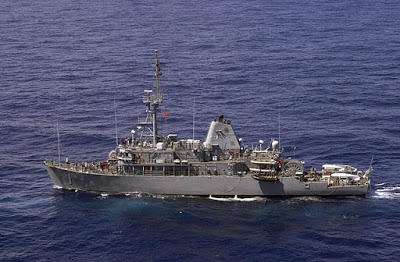 The weekly collection of useless and fun facts. In this week’s edition: Gold As Pay, Wooden US Navy Ships, When Lobster Wasn’t Popular, Olympic Tug of War, and an Evil Roulette Wheel.
The weekly collection of useless and fun facts. In this week’s edition: Gold As Pay, Wooden US Navy Ships, When Lobster Wasn’t Popular, Olympic Tug of War, and an Evil Roulette Wheel.
 La Rinconada, Peru is the highest elevated human habitation on earth at 16,732 feet above sea level. The city that has no trees and sits on the edge of a glacier has swelled to over 50,000 people for one reason; it has a productive goldmine. The mining company that operates it is Corporacion Ananea, and they use what they call the “cachorreo system” to pay the workers. They refer to it as an “informal” system, but if you read between the lines, it is in fact illegal. Under this system, miners work for 30 days without pay. On the 31st day, they are allowed to take as much ore as they can carry on their shoulders. It’s just a guess if there is any gold in the ore they carry home. The damage done by the mine on the town is apparent, and the Peruvian government, along with the mining company, have no plans to fix it. Source
La Rinconada, Peru is the highest elevated human habitation on earth at 16,732 feet above sea level. The city that has no trees and sits on the edge of a glacier has swelled to over 50,000 people for one reason; it has a productive goldmine. The mining company that operates it is Corporacion Ananea, and they use what they call the “cachorreo system” to pay the workers. They refer to it as an “informal” system, but if you read between the lines, it is in fact illegal. Under this system, miners work for 30 days without pay. On the 31st day, they are allowed to take as much ore as they can carry on their shoulders. It’s just a guess if there is any gold in the ore they carry home. The damage done by the mine on the town is apparent, and the Peruvian government, along with the mining company, have no plans to fix it. Source
 It may be hard to believe, but the US Navy still operates wooden ships, and they have a really good reason for doing so. They are known specifically as Avenger-class mine countermeasures ships, built between 1987 and 1994. The navy built 14 boats between these years, and they are deployed throughout the world. Their hulls’ were made from oak, Nootka Cypress, or Douglas-fir, which was coated in a plastic reinforced with glass. This effectively reduced the magnetic signature of the boat, which is important since mines are attracted to that sort of thing. The hull is about the only thing on these boats that is “old school”, and the rest of the ship is filled with all the latest technology for hunting and sweeping mines. When the ships find a mine, they have a couple of options to get rid of it. They can either cut the lines that hold the mine by dragging a wire through the water from the ship, or they can deploy an ROV to detonate the mine with a high-explosive charge. These class of ships still see a lot of action, especially in the Persian Gulf and the Strait of Hormuz. Source
It may be hard to believe, but the US Navy still operates wooden ships, and they have a really good reason for doing so. They are known specifically as Avenger-class mine countermeasures ships, built between 1987 and 1994. The navy built 14 boats between these years, and they are deployed throughout the world. Their hulls’ were made from oak, Nootka Cypress, or Douglas-fir, which was coated in a plastic reinforced with glass. This effectively reduced the magnetic signature of the boat, which is important since mines are attracted to that sort of thing. The hull is about the only thing on these boats that is “old school”, and the rest of the ship is filled with all the latest technology for hunting and sweeping mines. When the ships find a mine, they have a couple of options to get rid of it. They can either cut the lines that hold the mine by dragging a wire through the water from the ship, or they can deploy an ROV to detonate the mine with a high-explosive charge. These class of ships still see a lot of action, especially in the Persian Gulf and the Strait of Hormuz. Source
 Think about this the next time you’re out at your favorite, local seafood restaurant enjoying an expensive lobster platter. Lobster wasn’t always considered a delicacy like it is today. In colonial America, they were so plentiful that they were called the “poor man’s protein”, or “cockroach of the sea”. Because of their utter abundance, they were fed to prisoners, and even having a shell in a house was looked upon as a sign of poverty. The lobster had such a bad reputation that servants made stipulations in their contracts that they wouldn’t be forced to eat lobster more than three times in a week.
Think about this the next time you’re out at your favorite, local seafood restaurant enjoying an expensive lobster platter. Lobster wasn’t always considered a delicacy like it is today. In colonial America, they were so plentiful that they were called the “poor man’s protein”, or “cockroach of the sea”. Because of their utter abundance, they were fed to prisoners, and even having a shell in a house was looked upon as a sign of poverty. The lobster had such a bad reputation that servants made stipulations in their contracts that they wouldn’t be forced to eat lobster more than three times in a week.
So what made the change from lobster as trash food to a fancy delicacy? It started with the success of the canning industry in 1840 which allowed the growing demand for Maine lobster to be met on other areas of the east coast. Its demand spread next because of the railroad. When the railways began serving it to passengers who had no idea that it was considered less than ideal like people once thought, lobster demand began to shoot up as it was now considered an exotic item. And when demand increases, prices go up, as they did when the price of lobster hit its first peak in the 1920’s. The Great Depression caused another decline in the lobster’s reputation, but by the 1950’s it was known as a delicacy again and has stayed there ever since. Source, Source
 The sport of Tug of War has been around in one form or another since ancient times and was even a Summer Olympic event from 1900 to 1920. The competition was entered by clubs from each country, and a country could have more than one club in a competition. This meant that one country could win multiple medals. This happened in 1904 when the U.S. won all three medals in that year (its only medals in the sport) and Great Britain did the same in 1908. After the games in 1920, Tug of War was discontinued and removed as an Olympic sport since the International Olympic Committee felt there were too many sports and too many participants. They eliminated 34 sports after the 1920 Olympics, and Tug of War was one of them. Tug of War competitions continued, and in 1960, the Tug of War International Federation (TWIF) was established which set up international championships. The TWIF is still trying to get Tug of War reinstated in the Olympics to this day. Maybe in the future, Tug of War will be a summer games sport again. Who wouldn’t want to watch that? Source
The sport of Tug of War has been around in one form or another since ancient times and was even a Summer Olympic event from 1900 to 1920. The competition was entered by clubs from each country, and a country could have more than one club in a competition. This meant that one country could win multiple medals. This happened in 1904 when the U.S. won all three medals in that year (its only medals in the sport) and Great Britain did the same in 1908. After the games in 1920, Tug of War was discontinued and removed as an Olympic sport since the International Olympic Committee felt there were too many sports and too many participants. They eliminated 34 sports after the 1920 Olympics, and Tug of War was one of them. Tug of War competitions continued, and in 1960, the Tug of War International Federation (TWIF) was established which set up international championships. The TWIF is still trying to get Tug of War reinstated in the Olympics to this day. Maybe in the future, Tug of War will be a summer games sport again. Who wouldn’t want to watch that? Source
 So gambling might be a little evil? The casino game, roulette, is derived from the words “small wheel” in French, and the sum of all numbers on a roulette wheel equals 666. Legend has it that Francois Blanc, a Monte Carlo casino operator and also known as the “Magician of Monte Carlo”, bargained with the devil to get all the secrets to the game. Hence, the 666, or the “Number of the Beast” which is found in English translations of the Bible in Revelation 13:18. It’s a stretch for sure, but the numbers do add up to six hundred sixty-six.
So gambling might be a little evil? The casino game, roulette, is derived from the words “small wheel” in French, and the sum of all numbers on a roulette wheel equals 666. Legend has it that Francois Blanc, a Monte Carlo casino operator and also known as the “Magician of Monte Carlo”, bargained with the devil to get all the secrets to the game. Hence, the 666, or the “Number of the Beast” which is found in English translations of the Bible in Revelation 13:18. It’s a stretch for sure, but the numbers do add up to six hundred sixty-six.
Roulette has been around since the 18th century France and over the years has had many variations. The game is simple; a ball spins on the wheel and lands on a number, indicating the winning number. Where it gets complicated is the betting. Terms such as street, basket, Manque, Passe, and snake bet all denote different types of bets with different odds and different payouts. Mentioning anything else about the game would cause eyes to cross and minds to numb, so we’ll just leave it at that. It’s probably a fact that some consider the game evil when it takes their money all the time. Source
That’s it for yet another edition. Until next time and as always, use these facts to annoy those around you with your new found knowledge. Don’t worry, they’ll appreciate you for it. Feel free to comment below and share.
Past Issues of the Completely Random Facts of the Week

